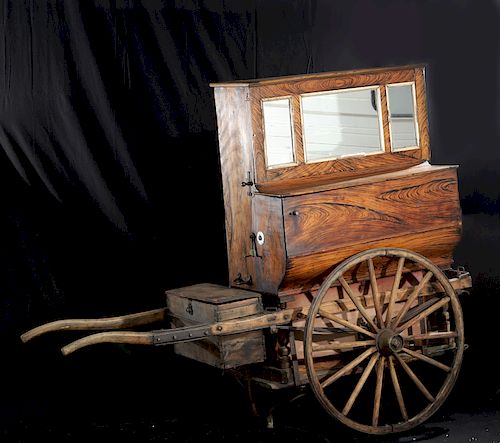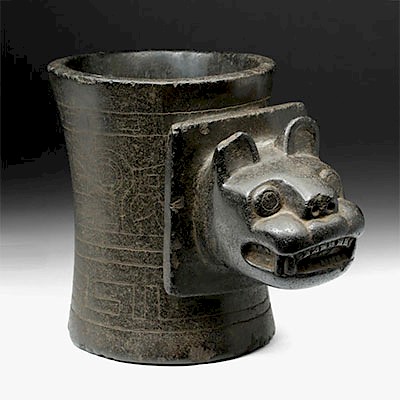19th C. American Wood Barrel Piano + Cart, George Hicks
Lot 95a
About Seller
Artemis Fine Arts
686 S Taylor Ave, Ste 106
Louisville, CO 80027
United States
Selling antiquities, ancient and ethnographic art online since 1993, Artemis Gallery specializes in Classical Antiquities (Egyptian, Greek, Roman, Near Eastern), Asian, Pre-Columbian, African / Tribal / Oceanographic art. Our extensive inventory includes pottery, stone, metal, wood, glass and textil...Read more
Estimate:
$7,000 - $10,000
Absentee vs Live bid
Two ways to bid:
- Leave a max absentee bid and the platform will bid on your behalf up to your maximum bid during the live auction.
- Bid live during the auction and your bids will be submitted real-time to the auctioneer.
Bid Increments
| Price | Bid Increment |
|---|---|
| $0 | $25 |
| $300 | $50 |
| $1,000 | $100 |
| $2,000 | $250 |
| $5,000 | $500 |
| $10,000 | $1,000 |
| $20,000 | $2,500 |
| $50,000 | $5,000 |
| $100,000 | $10,000 |
| $200,000 | $20,000 |
About Auction
By Artemis Fine Arts
Oct 3, 2019
Set Reminder
2019-10-03 10:00:00
2019-10-03 10:00:00
America/New_York
Bidsquare
Bidsquare : Exceptional Day 2: Pre-Columbian & Tribal Art
https://www.bidsquare.com/auctions/artemis-gallery/exceptional-day-2-pre-columbian-tribal-art-4453
Day 2 of an important 2-day auction featuring exceptional, museum-worthy examples of Pre-Columbian from the ancient Americas, Native American, African / Tribal, Oceanic, Spanish Colonial and fossils. Artemis Fine Arts info@artemisfinearts.com
Day 2 of an important 2-day auction featuring exceptional, museum-worthy examples of Pre-Columbian from the ancient Americas, Native American, African / Tribal, Oceanic, Spanish Colonial and fossils. Artemis Fine Arts info@artemisfinearts.com
- Lot Description
North America, made in Brooklyn, New York, by George Hicks (British, born England 1818–1863 Brooklyn, New York), ca. 1860 CE. A fantastically preserved wooden barrel piano, housed in a two-wheeled cart with a box seat. The barrel piano (also known as a cylinder piano, self-acting piano, street piano, cafe piano, or hurdy-gurdy) would have been a common sight in cities in the second half of the 19th century. It features a box with a crank that rotates a wooden cylinder studded with brass pins. As the player cranks the cylinder around, the pins engage the notes of the piano mechanism and play a song. Each piano could play multiple songs. In New York, many of them would have been folk songs from Ireland, Italy, or Germany, appealing to immigrants as the player pulled his wagon through the streets, playing tunes and asking for coins. Size of piano: 23" L x 38.75" W x 54.25" H (58.4 cm x 98.4 cm x 137.8 cm); size of piano inside the wagon: 83.5" L x 38" W x 35.5" H (212.1 cm x 96.5 cm x 90.2 cm)
The history of the barrel piano is not entirely clear, but it seems to have originated in Italy sometime in the late 1700s. We know they were being made in Bristol, England, by members of the Hicks family as early as 1805; in 1816, patriarch Joseph Hicks moved from making cabinets to only producing barrel pianos and barrel organs. Another family member, John Hicks, set up a similar shop in London. George Hicks, also related to them, moved to the United States and built barrel pianos there from around 1849 until his death in 1863.
The Metropolitan Museum of Art has a discussion of George Hicks' barrel pianos including a recording of one playing "Yankee Doodle" (Accession number: 89.4.2048) - give it a listen and imagine yourself on a New York City street in the late 1800s, enjoying the pop music of the day!
Provenance: private Glorieta, New Mexico, USA collection; originally from New York, USA collection to Texas, USA collection
All items legal to buy/sell under U.S. Statute covering cultural patrimony Code 2600, CHAPTER 14, and are guaranteed to be as described or your money back.
A Certificate of Authenticity will accompany all winning bids.
We ship worldwide and handle all shipping in-house for your convenience.
#149250Wear commensurate with age, including rich patina on all surfaces, some small losses, chips, nicks, and scratches. Fabric on back is torn near the base. Crank arm is lost so it is not clear if the instrument will play, but it seems to have all the components it needs aside from the crank arm. The wagon seat is loose.Condition
- Shipping Info
-
All shipping is handled in-house for your convenience. Your invoice from Artemis Gallery will include shipping calculation instructions. If in doubt, please inquire BEFORE bidding for estimated shipping costs for individual items.
-
- Buyer's Premium



 EUR
EUR CAD
CAD AUD
AUD GBP
GBP MXN
MXN HKD
HKD CNY
CNY MYR
MYR SEK
SEK SGD
SGD CHF
CHF THB
THB
















